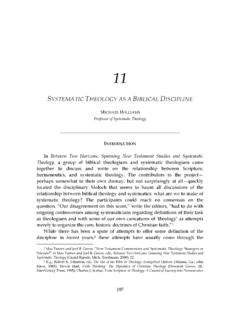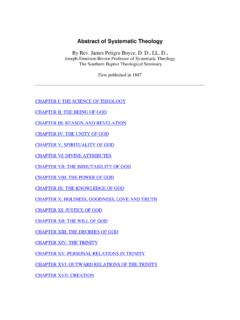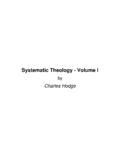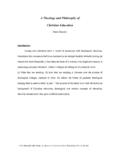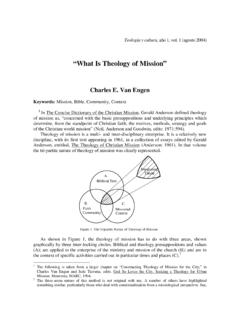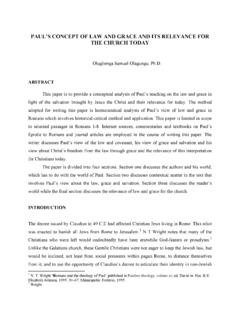Transcription of NOTES ON THE BOOK OF GENESIS - Dr. Sam's …
1 PREFACE TO NOTES ON THE BOOKS OF THE BIBLE The value of a Canonical Curriculm These studies are distillations of expository series on the Bible given to congregations, conferences, and churches of which I have been the minister. One of my tasks as a pastor was annually each summer to review the previous year s topics of my sermons, Bible studies and doctrinal series to ascertain: How much repetition have I inflicted on the people? How much of the Bible have I engaged in my sermons and studies?
2 How much have I left out? Which important doctrines, and what important teaching, have I not emphasized? Each minister -- indeed, each serious lay Christian -- should set before himself or herself a life-time canonical curriculum: namely, that at some point in life I determine to study each book of the Bible so as to grasp its structure, message and impact upon the people to whom it was written, upon my life and upon my involvement in the life of my community. In congregations of which I was the minister I have on more than one occasion employed such a curriculum over the space of the autumn, winter, and spring seasons, often reserving series on the Psalms for Sunday summer series sermons.
3 One year we went through each book of the Old Testament. The next season we went through each book of the New Testament. Bible study series were often convened on a mid-week evening. But now-a-days, it will be necessary to schedule many such opportunities for groups small and large, which meet variously during the week. The cure for absorption with pet themes, narrow-mindedness and tunnel vision as to grasping the message of the Bible is canon-wide study and appreciation of the plenary scope of the teaching of the scriptures.
4 Systematic book by book study sets the message of the Bible in its historical contexts and makes the application to today all the more incisive -- the concepts are not merely lifted out of context, bare-bones. Consistent, canon-wide study is the best cure for narrow, mind-shackling, brain-washing obsession. But what should be one s attitude to the scriptures in light of the never-ending modern tension between the scholarly and devotional uses of the Bible? It is quite remarkable how derisively dismissive secularists are in academic circles whenever the word bible is heard.
5 This attitude is simply proof of sustained ignorance of one of the most potent intellectual and cultural influences in the history of mankind. No one can think of himself or herself as an intellectual who does know the contents of the Bible. To be an educated person the study of the scriptures purely as classical literature which has profoundly affected the development of western civilization is mandatory. NOTES ON GENESIS Samuel J. Mikolaski The title ' GENESIS ' is a Greek word which means 'origin' or 'engendering.
6 ' GENESIS tells us about the beginning of the world and human life under God. This is a vital point of faith because no human knowledge, scientific or otherwise, can tell us about the ultimate origin of things: 'through faith we understand that the worlds were framed by the word of God, so that things which are seen were not made of things which do appear,' (Heb 11:3). This book discloses the fact of Creation and, as well, God's sovereign grace in choosing certain men, like Abraham, Isaac and Jacob, to fulfill His redemptive purpose.
7 Here are told, in limited and compressed form, the origin of the world, life, man, human institutions, sin and redemption. The story of Creation centers upon the creation and fall of humanity which, in turn, centers upon the line of Judah as the divinely chosen channel for the coming Redeemer (Gen 49:10). Authorship of GENESIS and of the Pentateuch Among the Jews there is a strong and consistent tradition of the Mosaic authorship of the Pentateuch, given the addition of some materials which could not have been written by Moses (for example, the story of his death) or by editors.
8 During the past one hundred years scholars advocating the Documentary Hypothesis have claimed that the books derive from periods considerably later than Moses, and that the books represent compilations of distinct literary and, at times, religious traditions. These, in general terms, are identified as: The Jehovistic narrative (J), said to derive from the ninth century B C. and to be characterized by the predominant use of the name Jehovah (Yahweh) for God.
9 The Elohistic narrative (E), claimed to originate from the eighth century and later, to favour the tradition of the Northern Tribes of Israel, and the name Elohim for God. The Deuteronomic document (D) is alleged to correspond roughly to Deuteronomy and to derive in part from the religious reform of Josiah. The alleged Priestly Code (P) is said to be concerned with Jewish sacrificial ceremonials, including the Tabernacle. This theory has undergone considerable modification and addition in recent years and has drawn strong criticism as well as support from scholars.
10 Vast quantities of new materials, textual, archaeological and historical, have been uncovered and have yet to be fully digested in scholarly study. New developments in OT literary criticism are emerging very rapidly in our time, in what was thought formerly to be a static study. That 'documents' ever existed is now denied by some, who advocate parallel and interlocking traditions instead. In my view the Pentateuch is not an accretion of loosely joined divergent literary traditions, but a congruous body of materials authentic to their times which present a consistent theological perspective.
